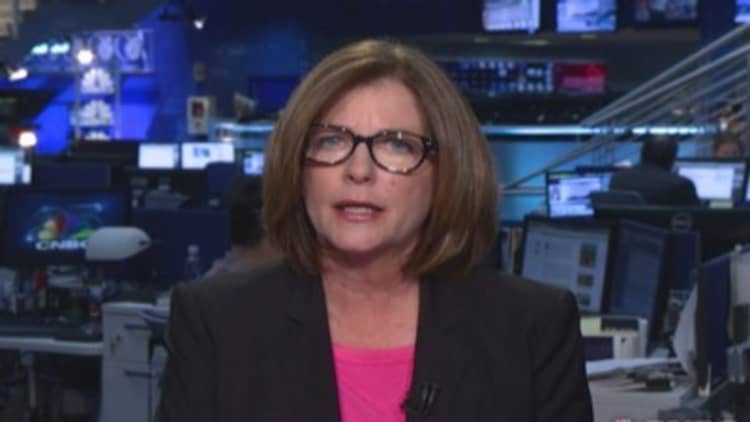Even with this week's weakness, Amazon.com stock has been outperforming the retailers whose businesses it's challenging, and on the eve of its earnings, it would be fair to assume Amazon will have a fairly volatile trading day after it reports.
Amazon has a history, in the last 10 years, of beating earnings-per-share estimates just slightly more than it misses, but the stock is very volatile after earnings days, averaging a 9.5 percent move either way, according to Bespoke. The company has reported revenue beats at a greater rate of 66.8 percent, versus the 56.4 percent beats on earnings per share.
The company reports after Thursday's closing bell, and is expected to have a loss of 15 cents per share on revenue of $19.34 billion, according to Thomson Reuters. That revenue would be 23 percent higher than the $15.70 billion in last year's second quarter. The company had a loss of 2 cents per share in that quarter a year ago.

Amazon stock fell 9.9 percent and 11 percent after its last two earnings reports, but rose 9.3 percent for the one prior in October of last year. The stock was under pressure along with momentum stocks earlier this year, but has been doing better since bottoming in May. It is still well off its 52-week high of about $408 and it was down 1 percent Wednesday in the high $350 range.
Citigroup downgraded the company Tuesday to "neutral" from "buy," citing its expectations for margin pressure after the Amazon Web Services price cut on April 1. "We believe this impact will likely persist for 2-3 quarters," wrote analyst Mark May. He cut his expectations for consolidated segment operating income and now is 18 percent below consensus. He also cut his price target to $395 from $414.
Read MoreUp, up and away! Tech trading above bubble highs
"While we believe that the core retail business is performing well and posting solid revenue growth and bottom-line leverage, we believe earnings and the stock could remain under pressure during this period of aggressive investment in AWS as many investors have become frustrated by AMZN's lack of leverage (continued aggressive investment) and lack of transparency," he wrote.
Bespoke tracks the performance of Amazon against 48 companies whose retail business it is impacting. It constructed its "Death by Amazon" index in 2012. Amazon has been outperforming the components of the market cap-weighted index for the past two months and it is outperforming the S&P 1500 on a two-year basis, after a rough start to the year. (see chart below)
Bespoke analyst George Pearkes said the index components are retailers whose main traffic is at brick-and-mortar stores, like Costco, Wal-Mart, Bed Bath and Beyond and Family Dollar.
Read MoreAs S&P nears 2000, analysts say keep an eye on this
"The market definitely does not look at Amazon in the same way as any other company of its size. It gives (CEO Jeff) Bezos so much room to play, as far as his margins and what he's spending on cap ex," said Pearkes.
Amazon is beating the market cap-weighted index by 39.8 percent over the last two years, but Wal-Mart is lagging by 12.5 percent. In the two-year period, Amazon shares have gained 59.2 percent while Wal-Mart's have risen just 6.9 percent.
Other names in the index include Gamestop, PetSmart, Office Depot, Macy's, Safeway, Walgreen, Zumiez, Foot Locker, CVS Caremark, Dick's Sporting Goods, Cabela's and Conn's.
Among the stocks that have outperformed the index is Kroger. With a stock gain of 132 percent, it's outpacing the index by 113 percent. Rite Aid stock has risen nearly fivefold in two years, and it is beating the index by 476 percent. Laggards include Francesca's, underperforming by 75 percent, with a stock decline of 55.3 percent. GNC stock, down 8.6 percent in two years, is lagging by 28 percent.
—By CNBC's Patti Domm


